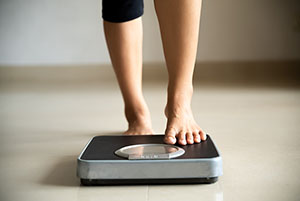For many patients, it takes more than a healthy diet to win the battle of the bulge. Our practice is typically a last resort for patients who have tried and failed many popular diet programs, from Jenny Craig to Weight Watchers to the South Beach Diet. What can be done for such patients? Should they just give up and accept their extra pounds? Fear not, we say, for there are powerful weapons to use when fighting the battle of the bulge! First, we begin with testing that will reveal each individual’s metabolic resistance to weight loss.
Helpful tests for weight loss patients:
The five-hour fasting glucose tolerance test with insulin is one of the most important tests for a weight loss patient. Not only will it identify diabetes, insulin resistance and hypoglycemia, but also the adrenaline response associated with sharp spikes and drops in blood sugar.
Food allergy tests reveal hidden sensitivities that a patient might have toward one or more foods, which can actually result in a reduction in metabolism and weight gain due to water retention if consumed. Food allergy researcher James Braly, M.D. says if someone is sensitive/intolerant to a food, they have difficulty losing weight. “One person’s ideal food can be another’s poison.” The body views a food to which it is sensitive as an external pollutant. Hence the aphorism: “The solution to pollution is dilution!” You will actually retain water when you consume foods you are sensitive to, resulting in weight gain seemingly overnight.
Genetic testing reveals genetic polymorphisms that predispose us to weight and/or health issues. Knowledge is power when it comes to dealing with individual metabolic propensities for weight loss.
Dysbiosis testing helps determine sensitivity and/or overgrowth to a species of yeast normally present in our bodies that may be responsible for food sensitivities, hormonal disturbances and other bodily ills. Identification of a sensitivity, and proper tailored treatment, can aid in the battle of the bulge.
A thorough thyroid panel is essential to determine if the thyroid gland is functioning optimally. The best diet in the world won’t help you lose weight if thyroid function is sub-optimal.
DHEA sulfate test measures the quantity of this youth hormone that has a sparing effect on muscle tissue and helps allay fat deposition. DHEA should ONLY be administered with supervision. That’s why it’s best to get tested first.
Hormone tests, such as estrogen, progesterone, and testosterone, can help identify hormone imbalances that can lead to excess fat storage in both men and women.
Adrenal function tests are necessary to reveal if high cortisol levels are present. Cortisol is a stress hormone that directs the body to store fat—especially belly fat.
After the results are in, we decide how to proceed to best help a patient reach their healthy weight. The plan of attack includes an individually tailored diet based on the unique biochemistries of the patient, along with the following supplements as appropriate:
EGCG: This powerful metabolism enhancer is isolated from green tea.
L-Carnitine: This amino acid ushers long chain fatty acids into the part of the cell that burns them as energy instead of storing them as fat.
Chromium: This blood-sugar-balancing trace mineral can help reduce cravings for sugar when patients follow a healthy diet.
Capsiate: The capsinoids from red pepper provide metabolic enhancement.
Dimpro: A dietary supplement that restores hormonal balance which may help to reverse hormonal weight gain.
Orthomega: Omega 3 fatty acids have been shown to combat insulin resistance which leads to fat accumulation around the mid-section.
L-Glutamine: A critical amino acid in the maintenance of gut integrity with the added bonus of helping to alleviate sugar cravings.
Those fighting the battle of the bulge need not fear. With our weapons for success, your fabulous results will soon be clear.
To your health!
Leyla Muedin, MS, RD, CDN







